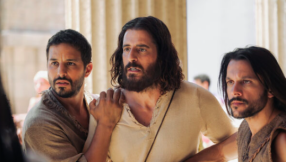Bishop of London seeks Common Christian Consciousness
"This is the mystery revealed in Christ: The more you go beyond yourself to the other, the more you will become your own true self," he said.
Thursday's programme began with meditations on the biblical account of Christ's transfiguration.
Bishop Chartres said that he had been struck by the insight of the Catholic Archbishop of Milan, Cardinal Dionigi Tettamanzi, that "our meeting here is itself a vision" of what the churches may become in Christ.
The Bishop contemplated the symbolism of images and contrasted "the two great signs that have been given to this generation", the mushroom cloud of nuclear destruction as opposed to the blue and sapphire globe photographed for the first time from space. He challenged delegates currently gathered at the EEA3 in Sibiu, Romania, which image would catch their imagination and shape the future for them.
Bishop Chartres also contrasted Christian assumptions about nature and life with rational philosophies. "Only in the sight of God, and in Christian faith", he said, "is it evident that all human beings are equal. Reason will not bring anyone to this conclusion."
He also contemplated what it would mean for Christian ethics and action if acceptance of the other as equal is a consequence of God's revelation in Jesus Christ. "Will we have the faith, hope and love to welcome the stranger, as Abraham welcomed strangers within his tent?"
In an afternoon press conference, the Bishop touched on doctrinal disagreements that impede church unity. "Experience together of Jesus Christ outflanks antique polemics," he said.
When asked whether the achievement of Christian consciousness could lead to agreement on a unified Christian policy in lobbying on such issues as abortion, euthanasia, stem cell research and "marriage as the union of one man with one woman", Bishop Chartres noted that consensus on euthanasia seems to be growing.
But he went on to say that Christians should beware policy positions that seem "a dull echo of some pre-packaged code of ethics that we take down from the shelf".













